Leadership, Operations Management, and Unilever's Strategies
VerifiedAdded on 2023/06/18
|15
|2984
|340
Report
AI Summary
This report provides an in-depth analysis of leadership and operations management within Unilever, a UK-based multinational company. It defines and compares the roles of leaders and managers, examining their application in various situational contexts. The report explores different theories and models, including situational leadership, systems leadership, and contingency theory, highlighting their impact on Unilever's operational strategies. It also explains key approaches to operations management, emphasizing their importance in achieving business objectives and assessing the factors within the business environment that influence operational decision-making. The discussion encompasses contemporary theory, management by objective, behavioral theory, and contingency theory, illustrating how Unilever adapts its strategies to address challenges such as rising production costs and market competition, utilizing leadership and management to drive organizational success.
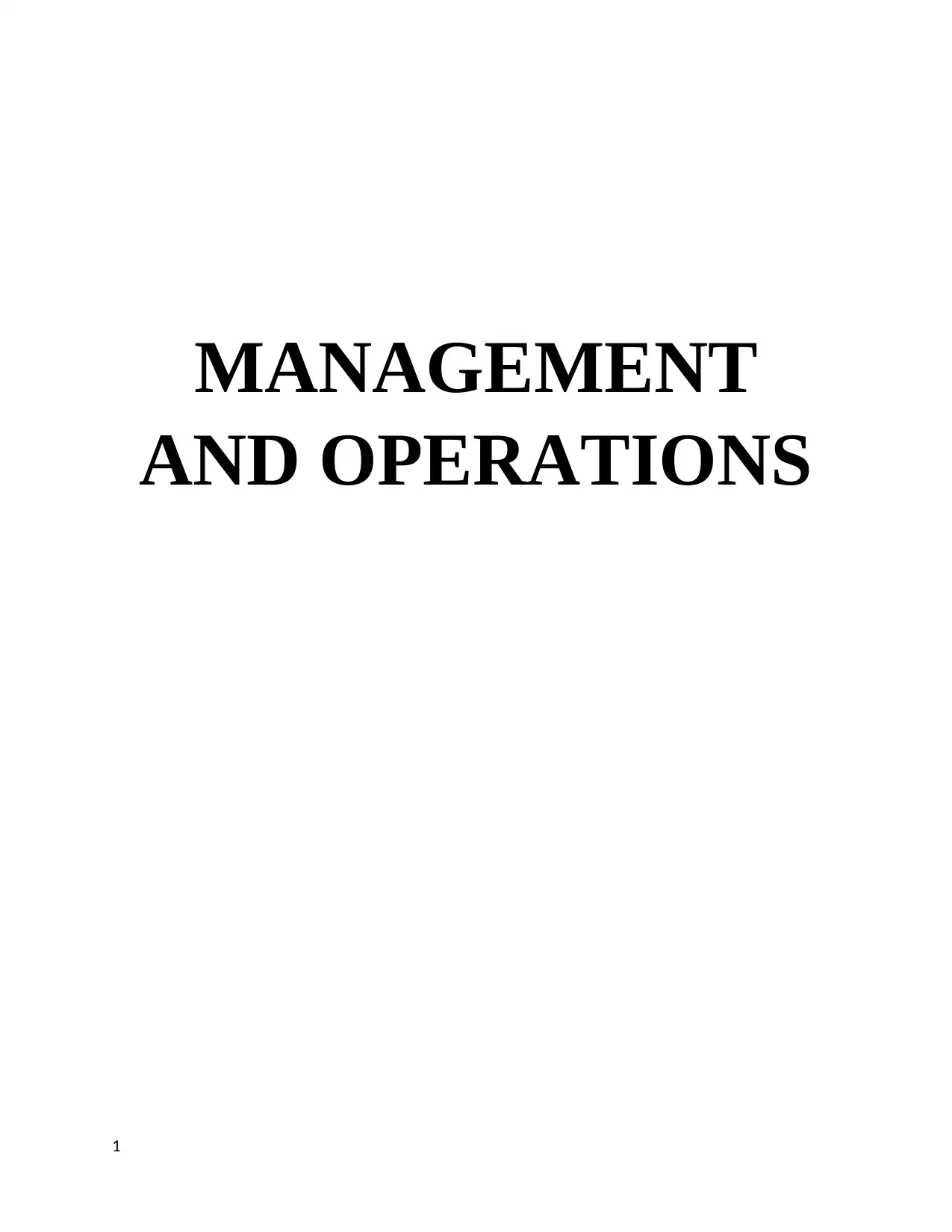
MANAGEMENT
AND OPERATIONS
1
AND OPERATIONS
1
Paraphrase This Document
Need a fresh take? Get an instant paraphrase of this document with our AI Paraphraser
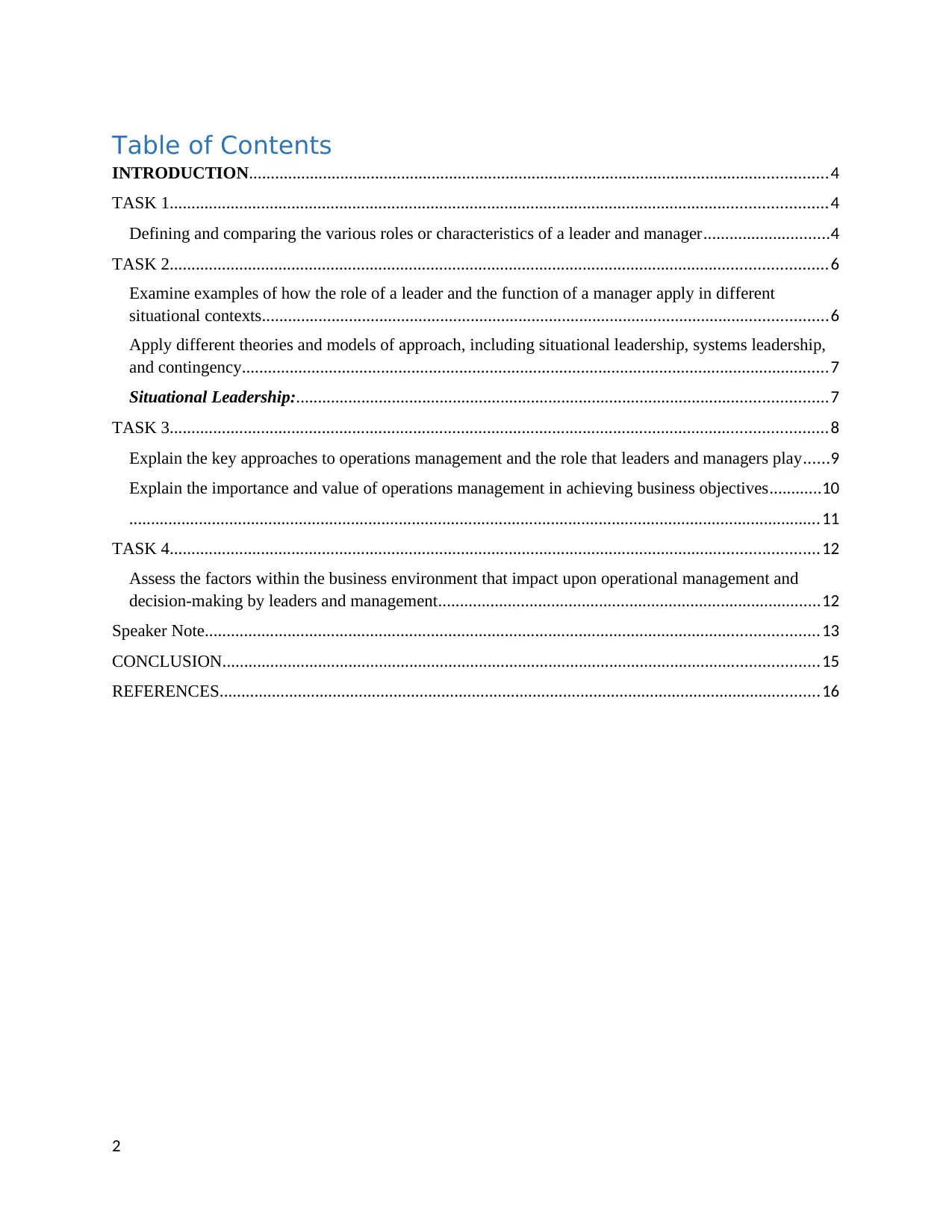
Table of Contents
INTRODUCTION.....................................................................................................................................4
TASK 1.......................................................................................................................................................4
Defining and comparing the various roles or characteristics of a leader and manager.............................4
TASK 2.......................................................................................................................................................6
Examine examples of how the role of a leader and the function of a manager apply in different
situational contexts..................................................................................................................................6
Apply different theories and models of approach, including situational leadership, systems leadership,
and contingency.......................................................................................................................................7
Situational Leadership:..........................................................................................................................7
TASK 3.......................................................................................................................................................8
Explain the key approaches to operations management and the role that leaders and managers play......9
Explain the importance and value of operations management in achieving business objectives............10
...............................................................................................................................................................11
TASK 4.....................................................................................................................................................12
Assess the factors within the business environment that impact upon operational management and
decision-making by leaders and management........................................................................................12
Speaker Note.............................................................................................................................................13
CONCLUSION.........................................................................................................................................15
REFERENCES..........................................................................................................................................16
2
INTRODUCTION.....................................................................................................................................4
TASK 1.......................................................................................................................................................4
Defining and comparing the various roles or characteristics of a leader and manager.............................4
TASK 2.......................................................................................................................................................6
Examine examples of how the role of a leader and the function of a manager apply in different
situational contexts..................................................................................................................................6
Apply different theories and models of approach, including situational leadership, systems leadership,
and contingency.......................................................................................................................................7
Situational Leadership:..........................................................................................................................7
TASK 3.......................................................................................................................................................8
Explain the key approaches to operations management and the role that leaders and managers play......9
Explain the importance and value of operations management in achieving business objectives............10
...............................................................................................................................................................11
TASK 4.....................................................................................................................................................12
Assess the factors within the business environment that impact upon operational management and
decision-making by leaders and management........................................................................................12
Speaker Note.............................................................................................................................................13
CONCLUSION.........................................................................................................................................15
REFERENCES..........................................................................................................................................16
2
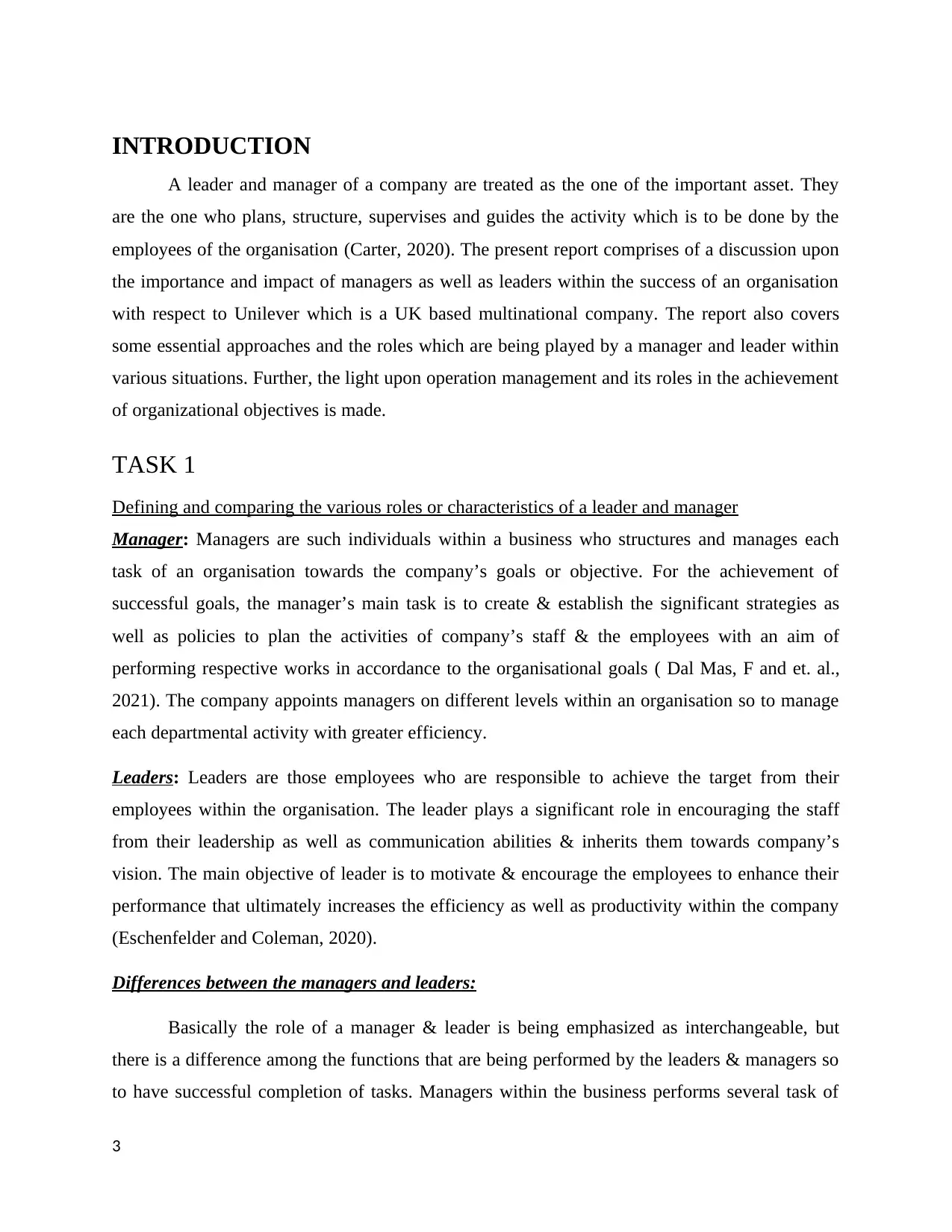
INTRODUCTION
A leader and manager of a company are treated as the one of the important asset. They
are the one who plans, structure, supervises and guides the activity which is to be done by the
employees of the organisation (Carter, 2020). The present report comprises of a discussion upon
the importance and impact of managers as well as leaders within the success of an organisation
with respect to Unilever which is a UK based multinational company. The report also covers
some essential approaches and the roles which are being played by a manager and leader within
various situations. Further, the light upon operation management and its roles in the achievement
of organizational objectives is made.
TASK 1
Defining and comparing the various roles or characteristics of a leader and manager
Manager: Managers are such individuals within a business who structures and manages each
task of an organisation towards the company’s goals or objective. For the achievement of
successful goals, the manager’s main task is to create & establish the significant strategies as
well as policies to plan the activities of company’s staff & the employees with an aim of
performing respective works in accordance to the organisational goals ( Dal Mas, F and et. al.,
2021). The company appoints managers on different levels within an organisation so to manage
each departmental activity with greater efficiency.
Leaders: Leaders are those employees who are responsible to achieve the target from their
employees within the organisation. The leader plays a significant role in encouraging the staff
from their leadership as well as communication abilities & inherits them towards company’s
vision. The main objective of leader is to motivate & encourage the employees to enhance their
performance that ultimately increases the efficiency as well as productivity within the company
(Eschenfelder and Coleman, 2020).
Differences between the managers and leaders:
Basically the role of a manager & leader is being emphasized as interchangeable, but
there is a difference among the functions that are being performed by the leaders & managers so
to have successful completion of tasks. Managers within the business performs several task of
3
A leader and manager of a company are treated as the one of the important asset. They
are the one who plans, structure, supervises and guides the activity which is to be done by the
employees of the organisation (Carter, 2020). The present report comprises of a discussion upon
the importance and impact of managers as well as leaders within the success of an organisation
with respect to Unilever which is a UK based multinational company. The report also covers
some essential approaches and the roles which are being played by a manager and leader within
various situations. Further, the light upon operation management and its roles in the achievement
of organizational objectives is made.
TASK 1
Defining and comparing the various roles or characteristics of a leader and manager
Manager: Managers are such individuals within a business who structures and manages each
task of an organisation towards the company’s goals or objective. For the achievement of
successful goals, the manager’s main task is to create & establish the significant strategies as
well as policies to plan the activities of company’s staff & the employees with an aim of
performing respective works in accordance to the organisational goals ( Dal Mas, F and et. al.,
2021). The company appoints managers on different levels within an organisation so to manage
each departmental activity with greater efficiency.
Leaders: Leaders are those employees who are responsible to achieve the target from their
employees within the organisation. The leader plays a significant role in encouraging the staff
from their leadership as well as communication abilities & inherits them towards company’s
vision. The main objective of leader is to motivate & encourage the employees to enhance their
performance that ultimately increases the efficiency as well as productivity within the company
(Eschenfelder and Coleman, 2020).
Differences between the managers and leaders:
Basically the role of a manager & leader is being emphasized as interchangeable, but
there is a difference among the functions that are being performed by the leaders & managers so
to have successful completion of tasks. Managers within the business performs several task of
3
⊘ This is a preview!⊘
Do you want full access?
Subscribe today to unlock all pages.

Trusted by 1+ million students worldwide
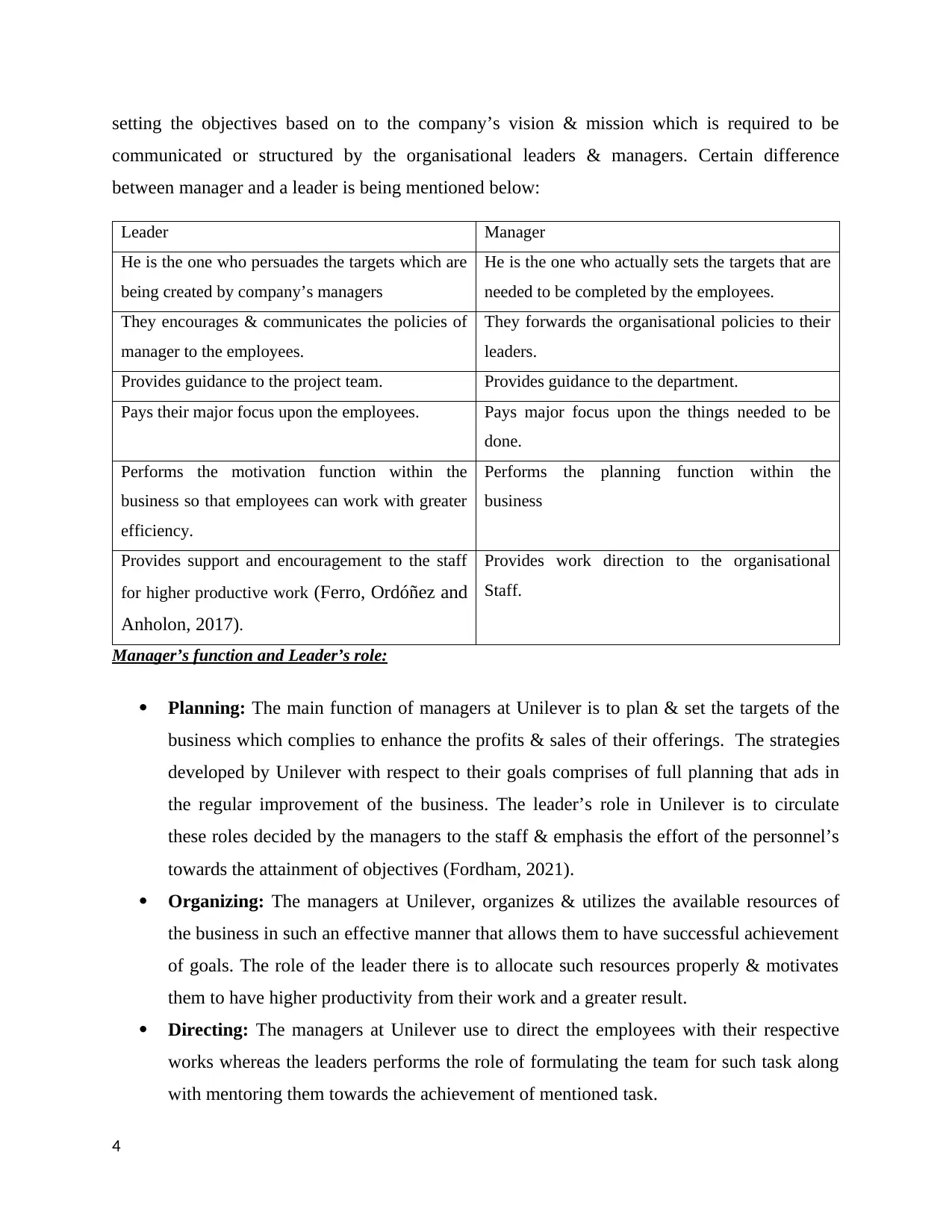
setting the objectives based on to the company’s vision & mission which is required to be
communicated or structured by the organisational leaders & managers. Certain difference
between manager and a leader is being mentioned below:
Leader Manager
He is the one who persuades the targets which are
being created by company’s managers
He is the one who actually sets the targets that are
needed to be completed by the employees.
They encourages & communicates the policies of
manager to the employees.
They forwards the organisational policies to their
leaders.
Provides guidance to the project team. Provides guidance to the department.
Pays their major focus upon the employees. Pays major focus upon the things needed to be
done.
Performs the motivation function within the
business so that employees can work with greater
efficiency.
Performs the planning function within the
business
Provides support and encouragement to the staff
for higher productive work (Ferro, Ordóñez and
Anholon, 2017).
Provides work direction to the organisational
Staff.
Manager’s function and Leader’s role:
Planning: The main function of managers at Unilever is to plan & set the targets of the
business which complies to enhance the profits & sales of their offerings. The strategies
developed by Unilever with respect to their goals comprises of full planning that ads in
the regular improvement of the business. The leader’s role in Unilever is to circulate
these roles decided by the managers to the staff & emphasis the effort of the personnel’s
towards the attainment of objectives (Fordham, 2021).
Organizing: The managers at Unilever, organizes & utilizes the available resources of
the business in such an effective manner that allows them to have successful achievement
of goals. The role of the leader there is to allocate such resources properly & motivates
them to have higher productivity from their work and a greater result.
Directing: The managers at Unilever use to direct the employees with their respective
works whereas the leaders performs the role of formulating the team for such task along
with mentoring them towards the achievement of mentioned task.
4
communicated or structured by the organisational leaders & managers. Certain difference
between manager and a leader is being mentioned below:
Leader Manager
He is the one who persuades the targets which are
being created by company’s managers
He is the one who actually sets the targets that are
needed to be completed by the employees.
They encourages & communicates the policies of
manager to the employees.
They forwards the organisational policies to their
leaders.
Provides guidance to the project team. Provides guidance to the department.
Pays their major focus upon the employees. Pays major focus upon the things needed to be
done.
Performs the motivation function within the
business so that employees can work with greater
efficiency.
Performs the planning function within the
business
Provides support and encouragement to the staff
for higher productive work (Ferro, Ordóñez and
Anholon, 2017).
Provides work direction to the organisational
Staff.
Manager’s function and Leader’s role:
Planning: The main function of managers at Unilever is to plan & set the targets of the
business which complies to enhance the profits & sales of their offerings. The strategies
developed by Unilever with respect to their goals comprises of full planning that ads in
the regular improvement of the business. The leader’s role in Unilever is to circulate
these roles decided by the managers to the staff & emphasis the effort of the personnel’s
towards the attainment of objectives (Fordham, 2021).
Organizing: The managers at Unilever, organizes & utilizes the available resources of
the business in such an effective manner that allows them to have successful achievement
of goals. The role of the leader there is to allocate such resources properly & motivates
them to have higher productivity from their work and a greater result.
Directing: The managers at Unilever use to direct the employees with their respective
works whereas the leaders performs the role of formulating the team for such task along
with mentoring them towards the achievement of mentioned task.
4
Paraphrase This Document
Need a fresh take? Get an instant paraphrase of this document with our AI Paraphraser
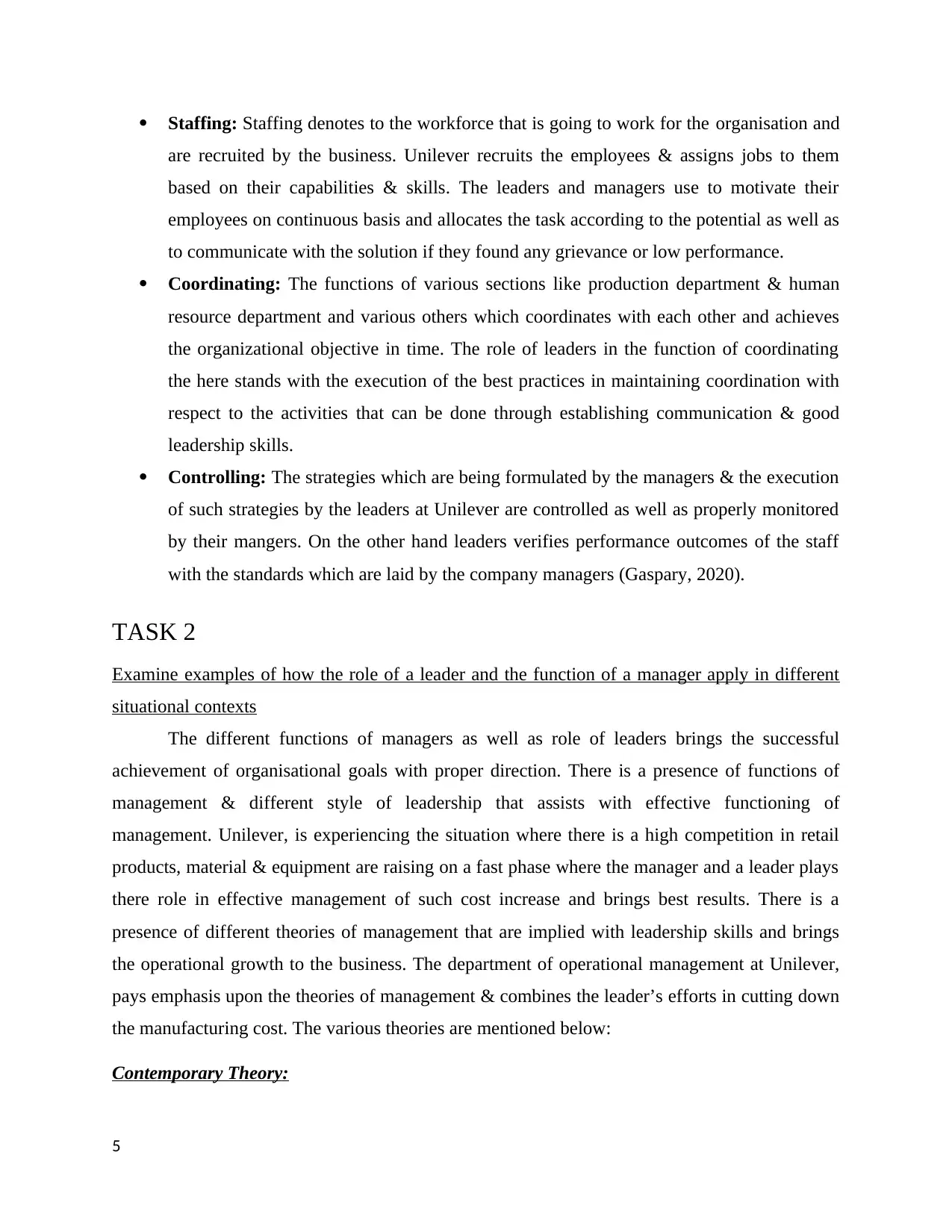
Staffing: Staffing denotes to the workforce that is going to work for the organisation and
are recruited by the business. Unilever recruits the employees & assigns jobs to them
based on their capabilities & skills. The leaders and managers use to motivate their
employees on continuous basis and allocates the task according to the potential as well as
to communicate with the solution if they found any grievance or low performance.
Coordinating: The functions of various sections like production department & human
resource department and various others which coordinates with each other and achieves
the organizational objective in time. The role of leaders in the function of coordinating
the here stands with the execution of the best practices in maintaining coordination with
respect to the activities that can be done through establishing communication & good
leadership skills.
Controlling: The strategies which are being formulated by the managers & the execution
of such strategies by the leaders at Unilever are controlled as well as properly monitored
by their mangers. On the other hand leaders verifies performance outcomes of the staff
with the standards which are laid by the company managers (Gaspary, 2020).
TASK 2
Examine examples of how the role of a leader and the function of a manager apply in different
situational contexts
The different functions of managers as well as role of leaders brings the successful
achievement of organisational goals with proper direction. There is a presence of functions of
management & different style of leadership that assists with effective functioning of
management. Unilever, is experiencing the situation where there is a high competition in retail
products, material & equipment are raising on a fast phase where the manager and a leader plays
there role in effective management of such cost increase and brings best results. There is a
presence of different theories of management that are implied with leadership skills and brings
the operational growth to the business. The department of operational management at Unilever,
pays emphasis upon the theories of management & combines the leader’s efforts in cutting down
the manufacturing cost. The various theories are mentioned below:
Contemporary Theory:
5
are recruited by the business. Unilever recruits the employees & assigns jobs to them
based on their capabilities & skills. The leaders and managers use to motivate their
employees on continuous basis and allocates the task according to the potential as well as
to communicate with the solution if they found any grievance or low performance.
Coordinating: The functions of various sections like production department & human
resource department and various others which coordinates with each other and achieves
the organizational objective in time. The role of leaders in the function of coordinating
the here stands with the execution of the best practices in maintaining coordination with
respect to the activities that can be done through establishing communication & good
leadership skills.
Controlling: The strategies which are being formulated by the managers & the execution
of such strategies by the leaders at Unilever are controlled as well as properly monitored
by their mangers. On the other hand leaders verifies performance outcomes of the staff
with the standards which are laid by the company managers (Gaspary, 2020).
TASK 2
Examine examples of how the role of a leader and the function of a manager apply in different
situational contexts
The different functions of managers as well as role of leaders brings the successful
achievement of organisational goals with proper direction. There is a presence of functions of
management & different style of leadership that assists with effective functioning of
management. Unilever, is experiencing the situation where there is a high competition in retail
products, material & equipment are raising on a fast phase where the manager and a leader plays
there role in effective management of such cost increase and brings best results. There is a
presence of different theories of management that are implied with leadership skills and brings
the operational growth to the business. The department of operational management at Unilever,
pays emphasis upon the theories of management & combines the leader’s efforts in cutting down
the manufacturing cost. The various theories are mentioned below:
Contemporary Theory:
5
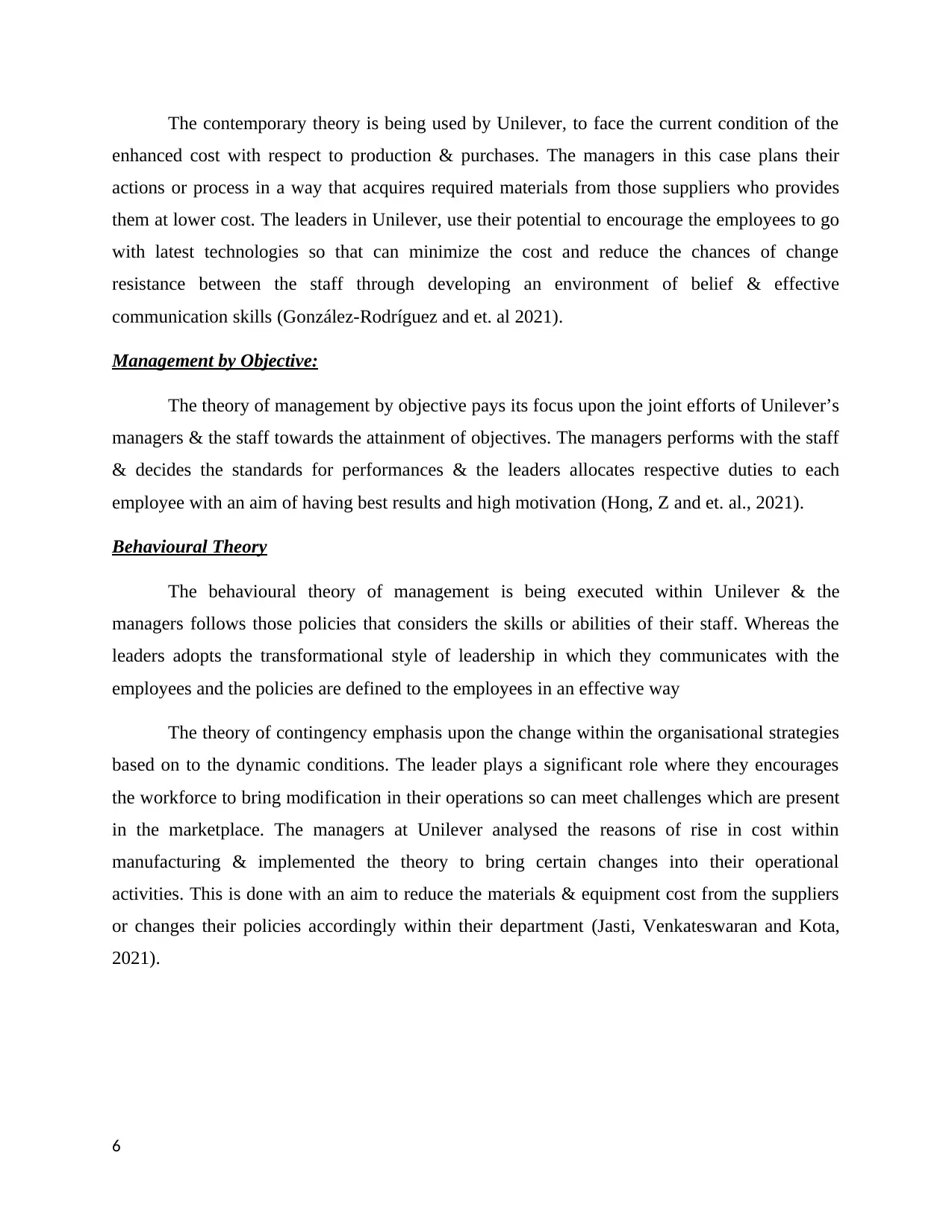
The contemporary theory is being used by Unilever, to face the current condition of the
enhanced cost with respect to production & purchases. The managers in this case plans their
actions or process in a way that acquires required materials from those suppliers who provides
them at lower cost. The leaders in Unilever, use their potential to encourage the employees to go
with latest technologies so that can minimize the cost and reduce the chances of change
resistance between the staff through developing an environment of belief & effective
communication skills (González-Rodríguez and et. al 2021).
Management by Objective:
The theory of management by objective pays its focus upon the joint efforts of Unilever’s
managers & the staff towards the attainment of objectives. The managers performs with the staff
& decides the standards for performances & the leaders allocates respective duties to each
employee with an aim of having best results and high motivation (Hong, Z and et. al., 2021).
Behavioural Theory
The behavioural theory of management is being executed within Unilever & the
managers follows those policies that considers the skills or abilities of their staff. Whereas the
leaders adopts the transformational style of leadership in which they communicates with the
employees and the policies are defined to the employees in an effective way
The theory of contingency emphasis upon the change within the organisational strategies
based on to the dynamic conditions. The leader plays a significant role where they encourages
the workforce to bring modification in their operations so can meet challenges which are present
in the marketplace. The managers at Unilever analysed the reasons of rise in cost within
manufacturing & implemented the theory to bring certain changes into their operational
activities. This is done with an aim to reduce the materials & equipment cost from the suppliers
or changes their policies accordingly within their department (Jasti, Venkateswaran and Kota,
2021).
6
enhanced cost with respect to production & purchases. The managers in this case plans their
actions or process in a way that acquires required materials from those suppliers who provides
them at lower cost. The leaders in Unilever, use their potential to encourage the employees to go
with latest technologies so that can minimize the cost and reduce the chances of change
resistance between the staff through developing an environment of belief & effective
communication skills (González-Rodríguez and et. al 2021).
Management by Objective:
The theory of management by objective pays its focus upon the joint efforts of Unilever’s
managers & the staff towards the attainment of objectives. The managers performs with the staff
& decides the standards for performances & the leaders allocates respective duties to each
employee with an aim of having best results and high motivation (Hong, Z and et. al., 2021).
Behavioural Theory
The behavioural theory of management is being executed within Unilever & the
managers follows those policies that considers the skills or abilities of their staff. Whereas the
leaders adopts the transformational style of leadership in which they communicates with the
employees and the policies are defined to the employees in an effective way
The theory of contingency emphasis upon the change within the organisational strategies
based on to the dynamic conditions. The leader plays a significant role where they encourages
the workforce to bring modification in their operations so can meet challenges which are present
in the marketplace. The managers at Unilever analysed the reasons of rise in cost within
manufacturing & implemented the theory to bring certain changes into their operational
activities. This is done with an aim to reduce the materials & equipment cost from the suppliers
or changes their policies accordingly within their department (Jasti, Venkateswaran and Kota,
2021).
6
⊘ This is a preview!⊘
Do you want full access?
Subscribe today to unlock all pages.

Trusted by 1+ million students worldwide
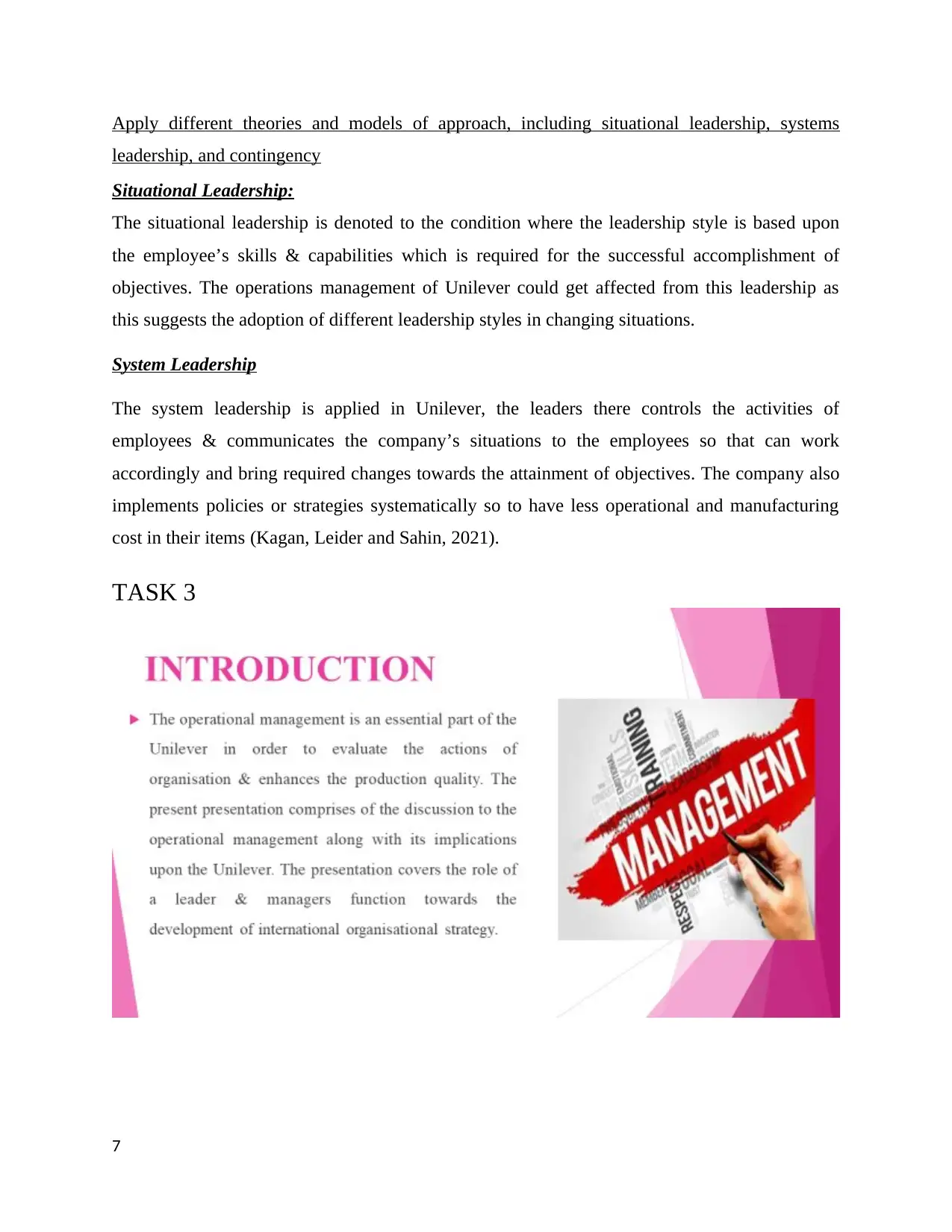
Apply different theories and models of approach, including situational leadership, systems
leadership, and contingency
Situational Leadership:
The situational leadership is denoted to the condition where the leadership style is based upon
the employee’s skills & capabilities which is required for the successful accomplishment of
objectives. The operations management of Unilever could get affected from this leadership as
this suggests the adoption of different leadership styles in changing situations.
System Leadership
The system leadership is applied in Unilever, the leaders there controls the activities of
employees & communicates the company’s situations to the employees so that can work
accordingly and bring required changes towards the attainment of objectives. The company also
implements policies or strategies systematically so to have less operational and manufacturing
cost in their items (Kagan, Leider and Sahin, 2021).
TASK 3
7
leadership, and contingency
Situational Leadership:
The situational leadership is denoted to the condition where the leadership style is based upon
the employee’s skills & capabilities which is required for the successful accomplishment of
objectives. The operations management of Unilever could get affected from this leadership as
this suggests the adoption of different leadership styles in changing situations.
System Leadership
The system leadership is applied in Unilever, the leaders there controls the activities of
employees & communicates the company’s situations to the employees so that can work
accordingly and bring required changes towards the attainment of objectives. The company also
implements policies or strategies systematically so to have less operational and manufacturing
cost in their items (Kagan, Leider and Sahin, 2021).
TASK 3
7
Paraphrase This Document
Need a fresh take? Get an instant paraphrase of this document with our AI Paraphraser
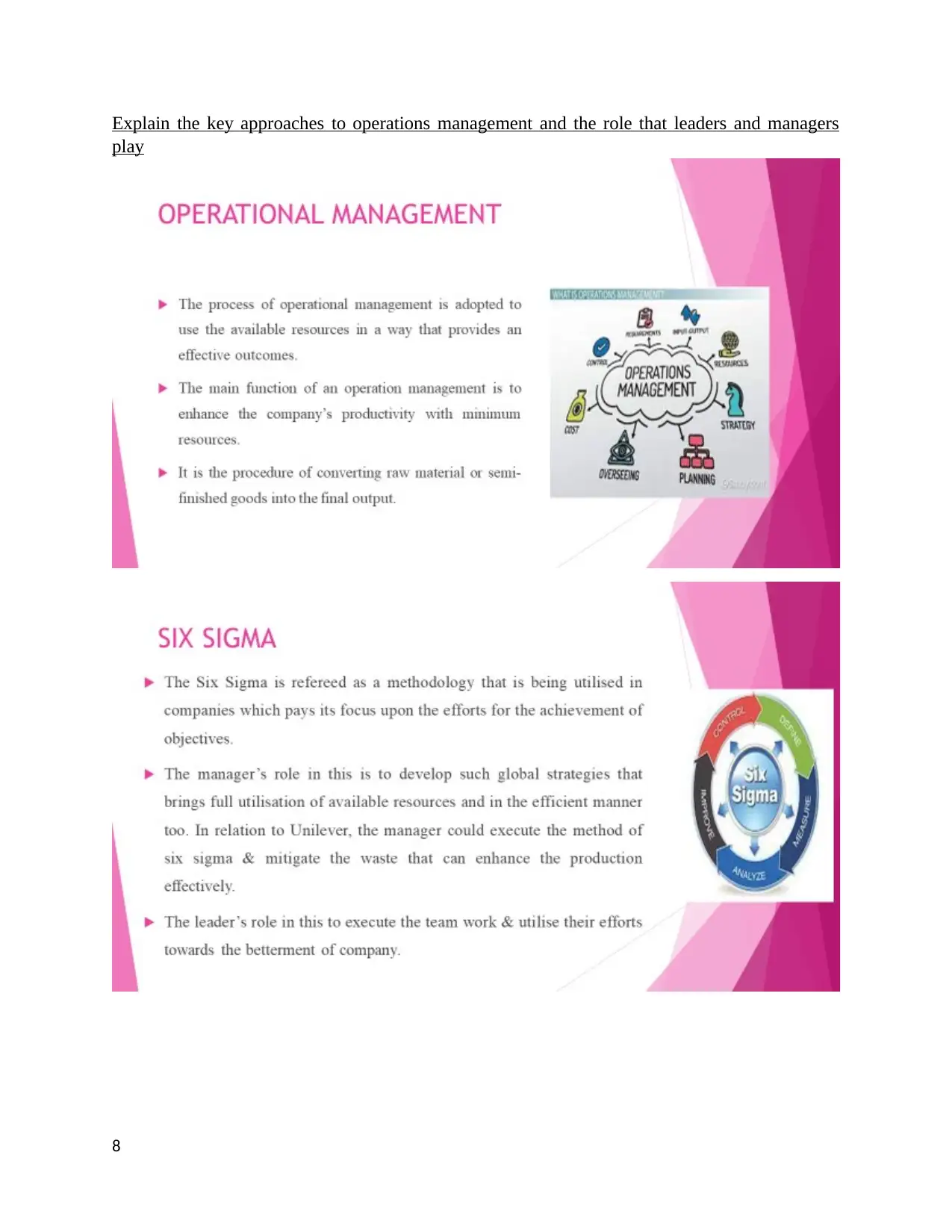
Explain the key approaches to operations management and the role that leaders and managers
play
8
play
8
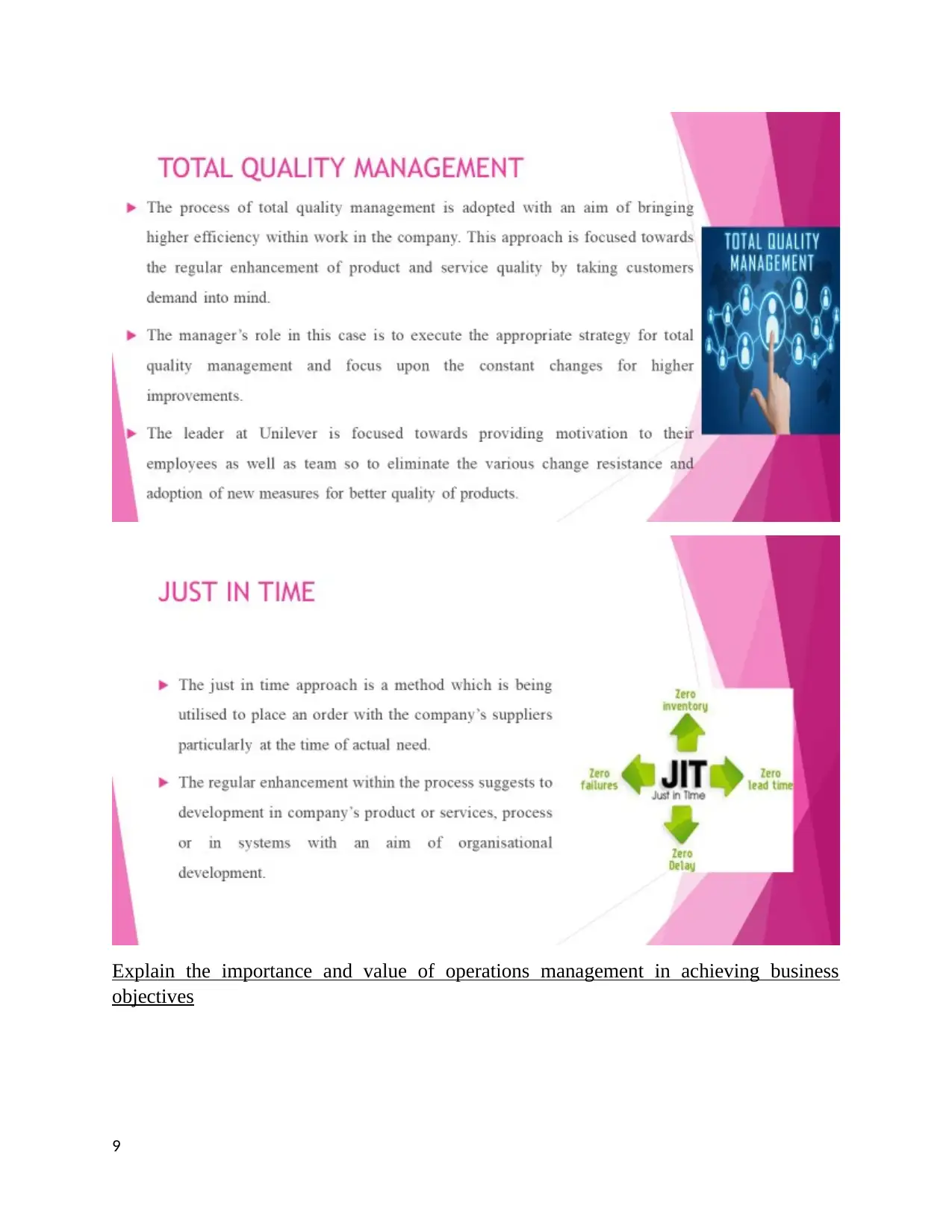
Explain the importance and value of operations management in achieving business
objectives
9
objectives
9
⊘ This is a preview!⊘
Do you want full access?
Subscribe today to unlock all pages.

Trusted by 1+ million students worldwide
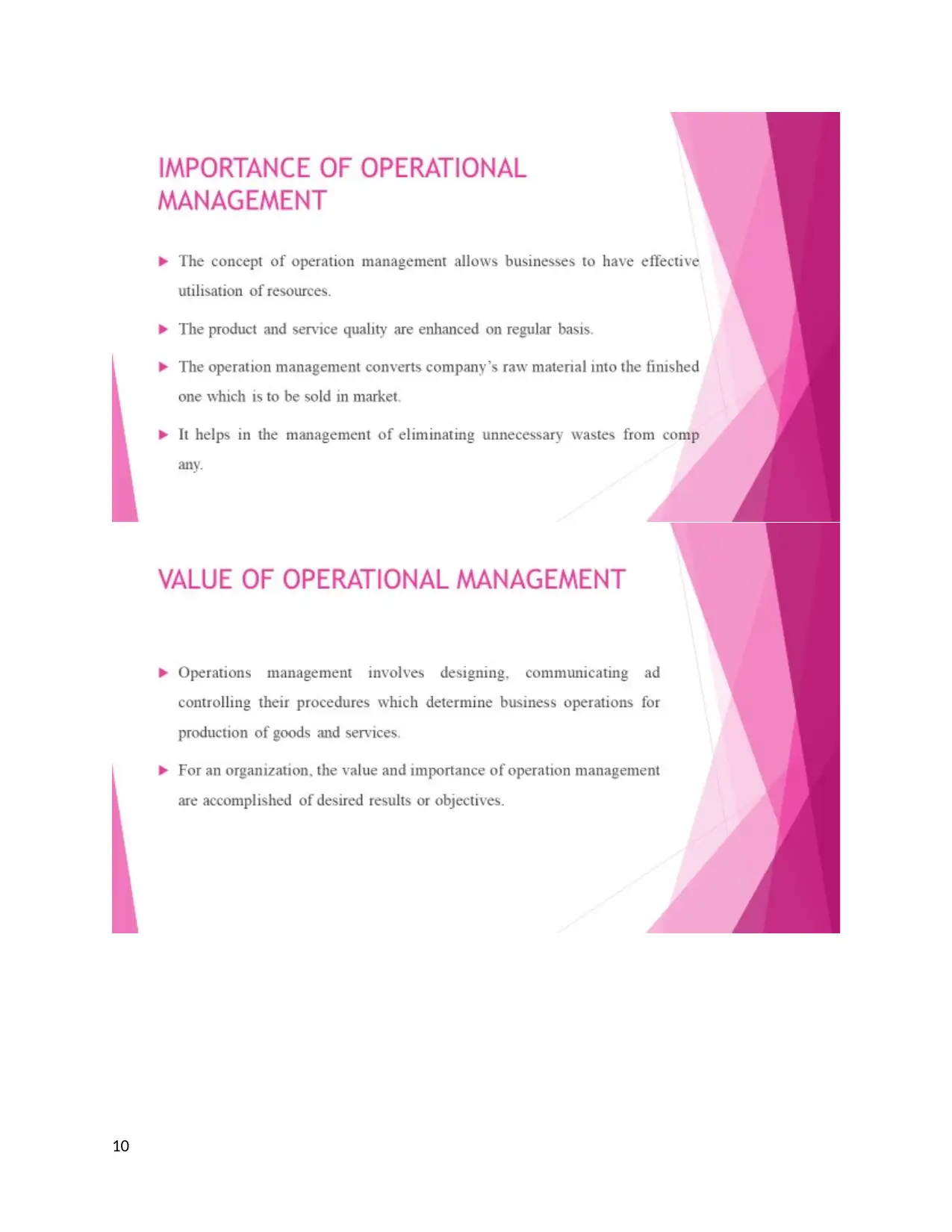
10
Paraphrase This Document
Need a fresh take? Get an instant paraphrase of this document with our AI Paraphraser
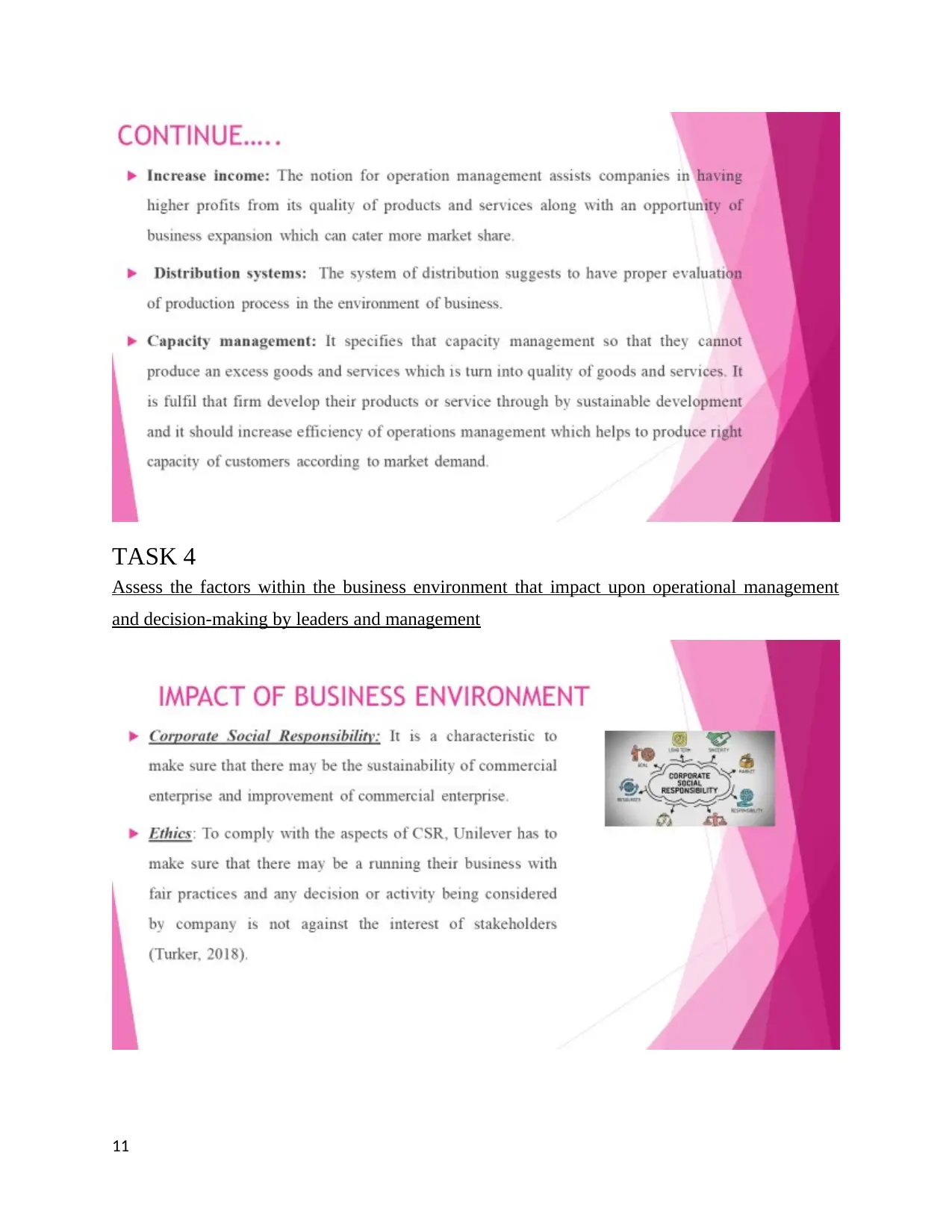
TASK 4
Assess the factors within the business environment that impact upon operational management
and decision-making by leaders and management
11
Assess the factors within the business environment that impact upon operational management
and decision-making by leaders and management
11
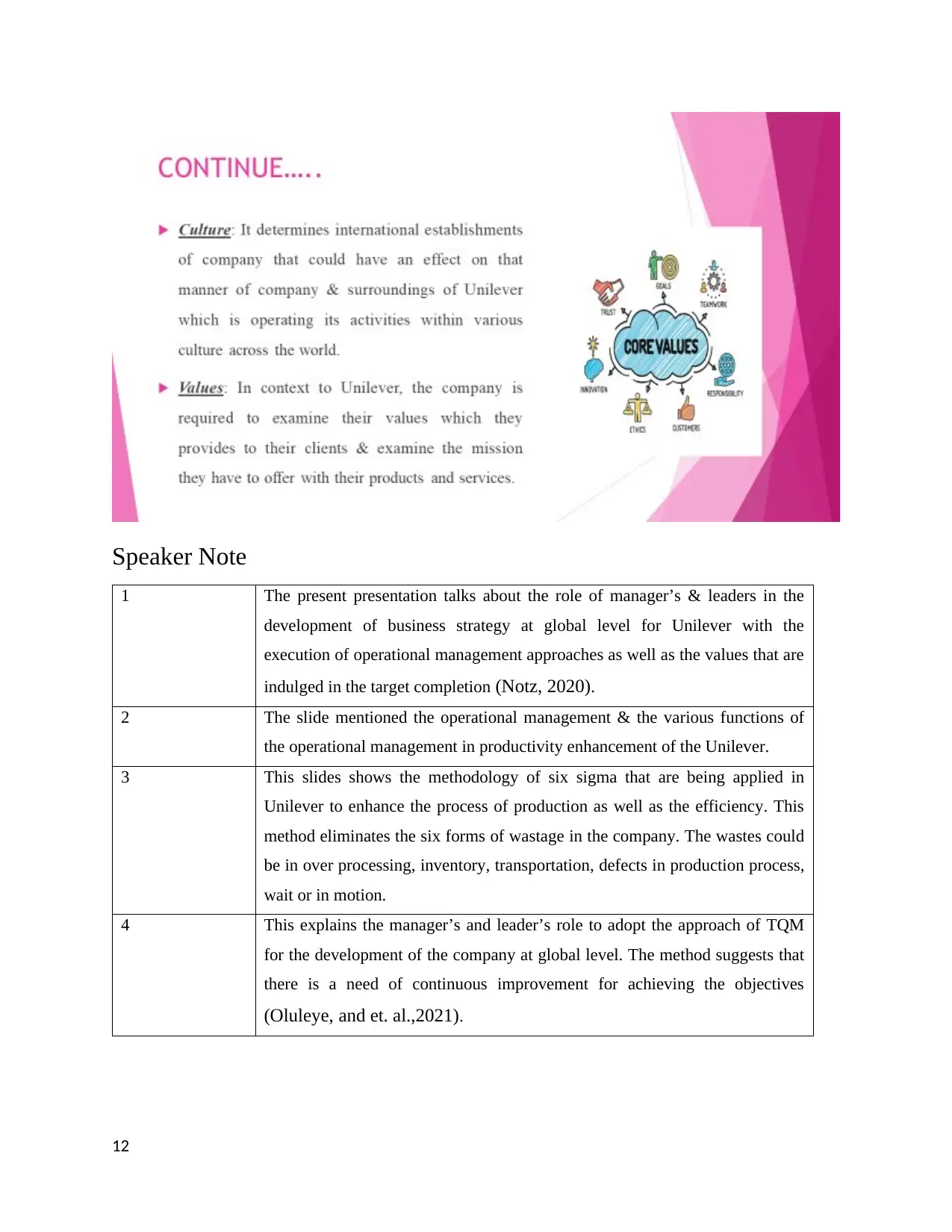
Speaker Note
1 The present presentation talks about the role of manager’s & leaders in the
development of business strategy at global level for Unilever with the
execution of operational management approaches as well as the values that are
indulged in the target completion (Notz, 2020).
2 The slide mentioned the operational management & the various functions of
the operational management in productivity enhancement of the Unilever.
3 This slides shows the methodology of six sigma that are being applied in
Unilever to enhance the process of production as well as the efficiency. This
method eliminates the six forms of wastage in the company. The wastes could
be in over processing, inventory, transportation, defects in production process,
wait or in motion.
4 This explains the manager’s and leader’s role to adopt the approach of TQM
for the development of the company at global level. The method suggests that
there is a need of continuous improvement for achieving the objectives
(Oluleye, and et. al.,2021).
12
1 The present presentation talks about the role of manager’s & leaders in the
development of business strategy at global level for Unilever with the
execution of operational management approaches as well as the values that are
indulged in the target completion (Notz, 2020).
2 The slide mentioned the operational management & the various functions of
the operational management in productivity enhancement of the Unilever.
3 This slides shows the methodology of six sigma that are being applied in
Unilever to enhance the process of production as well as the efficiency. This
method eliminates the six forms of wastage in the company. The wastes could
be in over processing, inventory, transportation, defects in production process,
wait or in motion.
4 This explains the manager’s and leader’s role to adopt the approach of TQM
for the development of the company at global level. The method suggests that
there is a need of continuous improvement for achieving the objectives
(Oluleye, and et. al.,2021).
12
⊘ This is a preview!⊘
Do you want full access?
Subscribe today to unlock all pages.

Trusted by 1+ million students worldwide
1 out of 15
Related Documents
Your All-in-One AI-Powered Toolkit for Academic Success.
+13062052269
info@desklib.com
Available 24*7 on WhatsApp / Email
![[object Object]](/_next/static/media/star-bottom.7253800d.svg)
Unlock your academic potential
Copyright © 2020–2026 A2Z Services. All Rights Reserved. Developed and managed by ZUCOL.





